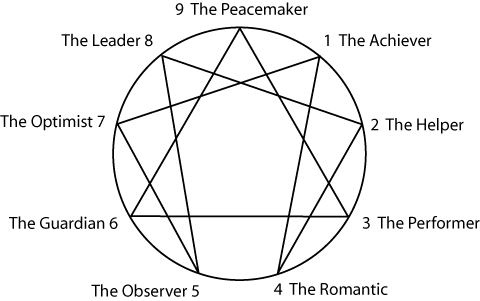Enneagram Series by Mark McGuinness
The Enneagram is a nine-pointed star drawn inside a circle. It has many meanings and uses – currently, it is best known as a system of personality types, where each of the nine points corresponds to a different type.

I was introduced to the Enneagram in 1997, since when I have found it a powerful and practical tool, in my own life and relationships, and in my work – originally as a psychotherapist and now as a business coach and consultant.
The Enneagram system is not confined to what modern psychology regards as the “personality” – it includes the whole of human nature, mental, emotional and physical – but I will limit this brief introduction to the personality types and how they can help you in your personal and professional development.
What can the Enneagram offer you?
Personal development
The Enneagram types are not made up of lists of character traits, but are founded on a person’s core values. Each type represents a fundamental decision about what is most important in life – such as power, security, harmony, knowledge or fulfillment. This decision is a two-edged sword: focusing on any of these important values enables us to make a valuable contribution in many areas of life; but it also causes us to neglect other values, creating a psychological “blind spot” that limits our perspective and prevents us from developing beyond a certain point.
Identifying your Enneagram type can show you this blind spot and open up unexpected options for change. It can help you break long standing patterns that have been holding you back, sometimes without your realising it.
Professional development
Whether or not knowing your strengths and weaknesses is important to you personally, it is vital to your professional development. Without this knowledge you risk choosing the wrong challenges or even the wrong career. You are also likely to keep coming up against the same obstacles to success.
Identifying and working with your Enneagram type can help you play to your strengths by choosing professional challenges that are most appealing and appropriate for your talents. Knowing your “blind spot” helps you work around the obstacles it creates for you.
Personal relationships
Well these don’t come with an instruction manual, do they? For most of us, personal relationships are most rewarding or the most frustrating part of life – or both. In some ways we can be so close to another, yet in others feel so apart. How many times have we all felt, when an argument starts or a misunderstanding arises, “That’s not what I meant at all!”?
Understanding your own and others’ Enneagram types allows you to relate to others with greater empathy and compassion, leading to less conflict and clearer communication.
Working relationships
It’s hard to think of a job in which dealing with people is not a vital skill. For anyone in one of the “people professions” – such as managing, teaching, counseling, coaching, consulting, sales, medicine or politics – it is central to the success or failure of your work.
The Enneagram offers you a powerful framework for relating to others more authentically and constructively. Whether influencing, managing, selling, caring, team-building, presenting or advising, it can help you communicate effectively and respectfully, extending your influence and opening up new options for collaboration.
Spirituality
I’ve left this one last as it’s perfectly possible to use the Enneagram as a practical tool for self-knowledge and relating to others without any spiritual element.
On the other hand, those with an interest in spiritual development will want to know that the Enneagram has been used as a framework for meditation and growth in several different spiritual traditions. For the Sufis, the mystics of Islam, the Enneagram is the “face of God”. Christian teachers have traced the seven deadly sins – and their antidotes – in the Enneagram types. And Buddhist teachers use the Enneagram as a “map of attachments” that can guide meditators on the way to awakening. More modern spiritual schools that use the Enneagram include the Fourth Way teachings of G.I. Gurdjieff and the Arica training of Oscar Ichazo.
So which Enneagram type are you?
Whether you are interested in secular or spiritual development, the Enneagram offers you a powerful lens for examining yourself and others – and making profound changes in your own life and relationships.
The first step towards using it is to familiarise yourself with the nine Enneagram types and start to get a sense of your own type. In my next few posts I’ll describe the nine types, but before we get to that here’s a short questionnaire to help you identify your type. It’s a shortened version of the Riso-Hudson Enneagram Type Indicator (RHETI) devised by well-known Enneagram authors Don Richard Riso and Russ Hudson.
Here’s a link to the free shorter version of the test – take 10 minutes to complete this questionnaire before my next post and it will make the descriptions of the types more relevant and interesting to you. [editor’s note 2021 – we’ve updated the link, as the original quiz was removed.]
I’m offering the link here to help you take the first step towards recognising your type – but don’t be too quick to jump to conclusions. It took me several months (and some brutal feedback from a well-meaning friend!) before I identified my own type correctly.
In my next post I’ll start to introduce the Enneagram types.
_____________
Mark studied the Enneagram as part of his training as a psychotherapist. He has used it for his own personal development and in his work with individuals, families, and organizations. Mark McGuinness’ business Wishful Thinking, is a specialist coaching and training service for creative businesses such as design studios, ad agencies, film and TV production companies, computer games developers, architect’s practices and fashion designers.
Part 2 in Enneagram — a Brief Introduction, The Heart Types, will appear Wednesday at about this same time.
Thank you, Mark,
–ME “Liz” Strauss